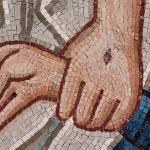Several hundred people gathered at the Courthouse in Lexington, Kentucky, on June 23rd to protest the Trump Administration’s inhumane and abusive practice of tearing children from their families who cross the border into the U.S. and putting them in cages. As my sign asked, “What child would Jesus cage?”
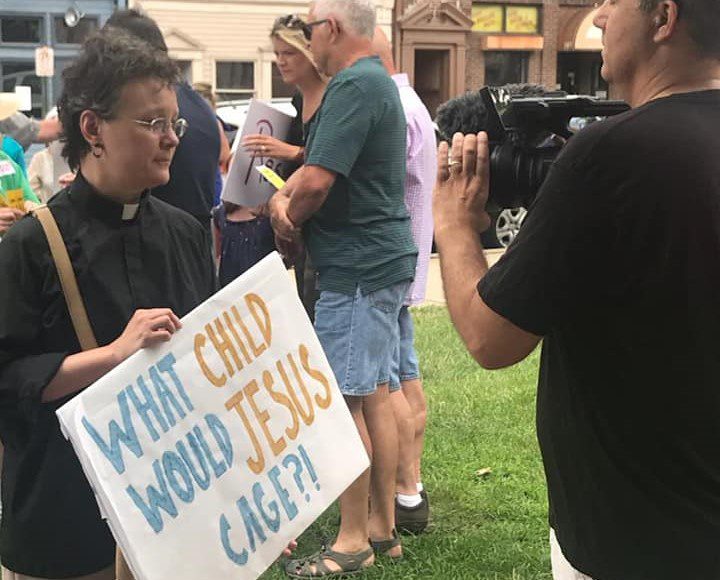
Among the crowd were students, faculty, and staff from Lexington Theological Seminary where I teach preaching and worship. We are in the midst of our intensive courses, and decided to rearrange our class schedule so that those who chose to do so could attend the rally. As our President Charisse Gillett and Dean Loida Martel encouraged us, sometimes being the church means going and doing, instead of just staying and praying.
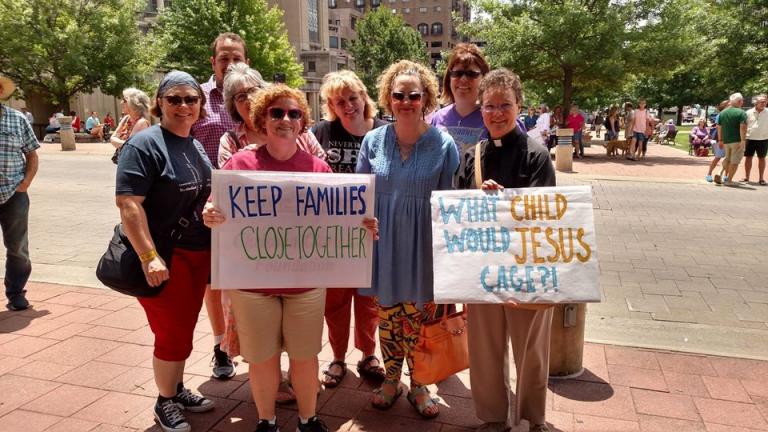
The rally was sponsored by the Kentucky chapter of the National Organization for Women (NOW) , and the Central Kentucky Council for Peace and Justice. Other organizations represented at the event included Kentucky Refugee Ministries, the Kentucky Equal Justice Center, the Bluegrass Activist Alliance and Kentuckians for the Commonwealth. As we listened to speakers who shared their experiences as immigrants, the children around us were a poignant reminder that no child deserves to be kidnapped from their families by the government, locked in a cage, drugged, neglected, and spirited away under cover of night with no plans for reunification.
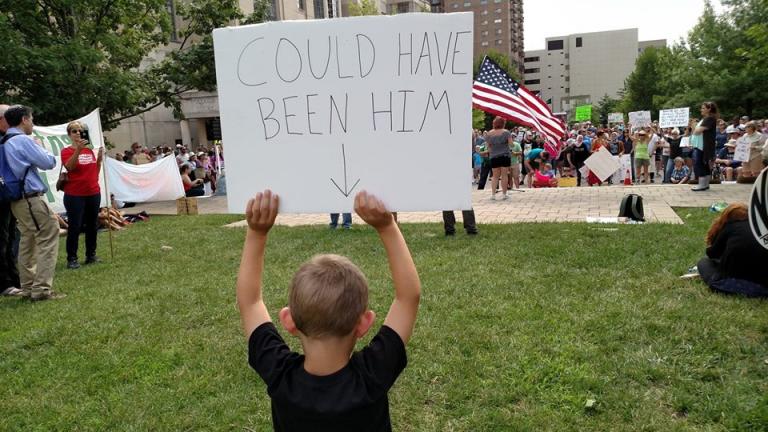
A lesson in public theology
For our students who are studying for ministry in various contexts throughout the country, this rally was a reminder of the importance of public theology. Standing in solidarity with those who suffer, joining our voices of faith to those who gather in the public square, and demanding the end of evil practices is part of what it means to be a faith leader.
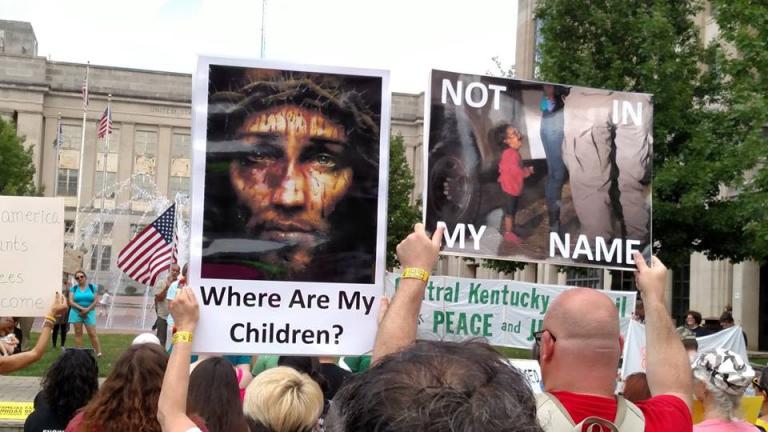
Romans 13 – read it in context
This point was highlighted by the Rev. Dalene Vasbinder, pastor of Woodland Christian Church in Lexington. She opened the rally with a prayer spoken first in Spanish and then in English. Later, she spoke about the need to counter the Administration’s heretical use of the Bible to justify abhorrent abuses of power.
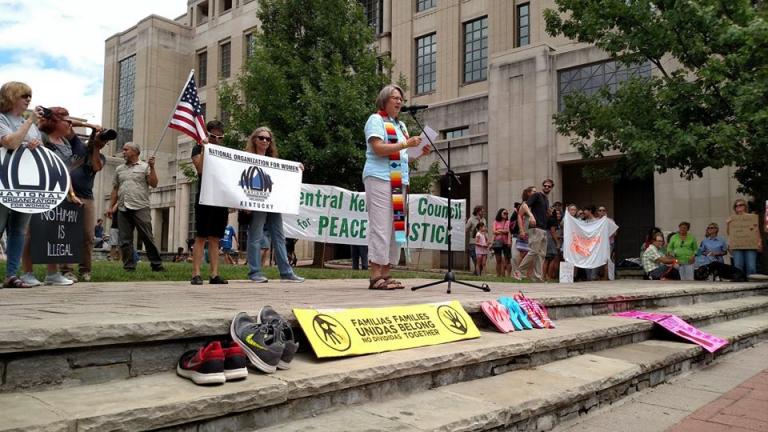
Attorney General Jeff Sessions cherry-picked a passage from the book of Romans as justification for separating children from their families. Romans 13: 1-5 reads:
Let every person be subject to the governing authorities; for there is no authority except from God, and those authorities that exist have been instituted by God. 2Therefore whoever resists authority resists what God has appointed, and those who resist will incur judgement. 3For rulers are not a terror to good conduct, but to bad. Do you wish to have no fear of the authority? Then do what is good, and you will receive its approval; 4for it is God’s servant for your good. But if you do what is wrong, you should be afraid, for the authority does not bear the sword in vain! It is the servant of God to execute wrath on the wrongdoer. 5Therefore one must be subject, not only because of wrath but also because of conscience.
Context is everything
Rev. Vasbinder pointed out, however, that there are passages immediately prior to and following this passage that provide the context in which these verses must be read and understood.
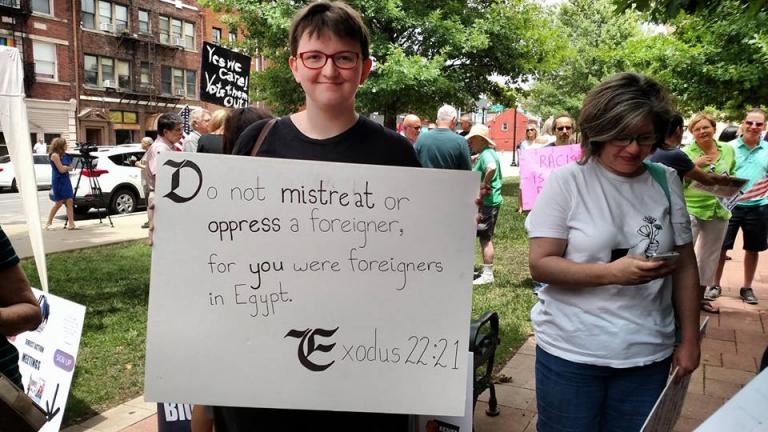
Just before Romans 13 is this verse from Romans 12:21.
21Do not be overcome by evil, but overcome evil with good.
And following the passage cited by Sessions is Romans 13:8 – 10.
8 Owe no one anything, except to love one another; for the one who loves another has fulfilled the law. 9The commandments, ‘You shall not commit adultery; You shall not murder; You shall not steal; You shall not covet’; and any other commandment, are summed up in this word, ‘Love your neighbor as yourself.’ 10Love does no wrong to a neighbor; therefore, love is the fulfilling of the law.
Thus we have to read Romans 13 within the context of Paul’s intention for the Christians he was addressing in Rome. Verses 1-5 are a warning not to succumb to anarchy, but to support governing powers when they are exercising their power within the proper context of the commandments and the goodness of God.
When read out of context (as German pastors did in the support of the Nazi regime), Romans 13:1-5 becomes a tool for oppression.
[Read this piece about the Administration’s violation of the Fourth Commandment: Is the Methodist Church Right to Condemn Jeff Sessions?]
This is why theological education matters.
This is why educated seminary students, clergy, and people of faith are vital for democracy. This is why being the church in the public square matters.
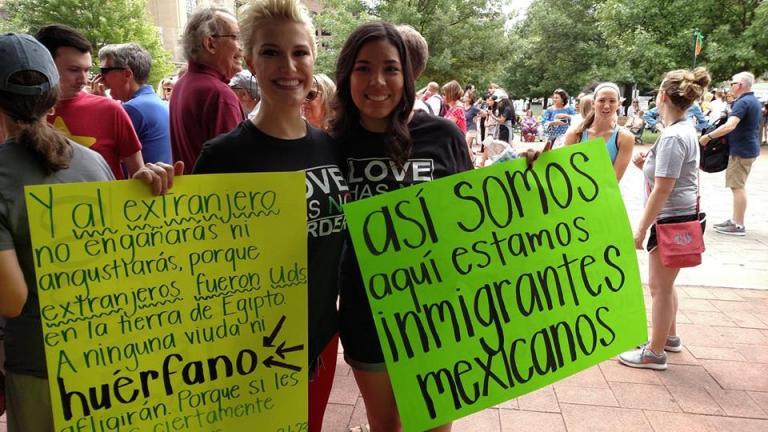
We must counter evil interpretations of scripture with strong condemnation and solid biblical knowledge. Our message of God’s love must lead to the cessation of abuse, violence, and the violation of human rights. And that message must be clear, simple, and repeated often.
Learn from the messaging
That’s one thing Christians and people of faith must learn from Trump, who is a very effective communicator – even as the content of his message is malevolent. He creates big lies and repeats them often. So we must proclaim the big truths of the gospel and repeat them often. At our dinner tables and in our schools. On the steps of the courthouse, and at the gate of the White House. On the streets and in our houses of worship. God’s truth and the gospel of Jesus must be proclaimed.
Every church, every pulpit, every time.
What can we do for these children and their families? Here is an article with 10 ways you can help: https://www.mother.ly/news/how-to-help-immigrant-children-separated-from-parents.

Leah D. Schade is the Assistant Professor of Preaching and Worship at Lexington Theological Seminary (Kentucky) and author of the book Creation-Crisis Preaching: Ecology, Theology, and the Pulpit (Chalice Press, 2015). She is an ordained minister in the Lutheran Church (ELCA).
Twitter: @LeahSchade
Facebook: https://www.facebook.com/LeahDSchade/.
Read also:
Mr. Trump, Here’s What’s Wrong with Calling People ‘Animals’
















